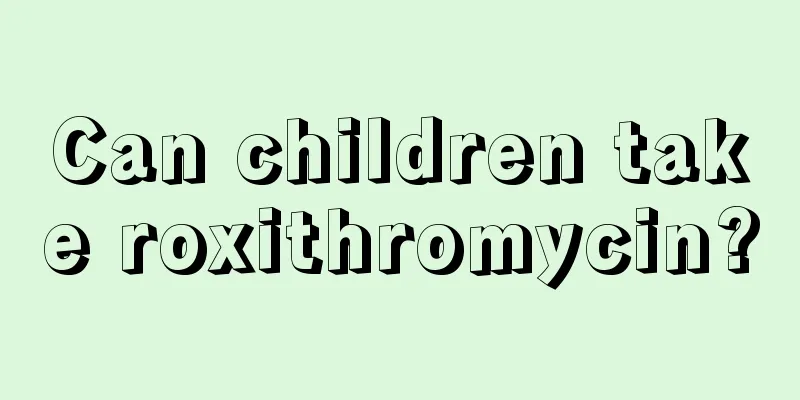Can children take roxithromycin?

|
In daily life, roxithromycin is a common drug. Children can also take roxithromycin. This drug is for children. If children have pharyngitis, tonsillitis, otitis media, chronic and acute bronchitis, the effect of using roxithromycin is very good. However, if children need to take it, they must take it under the guidance of a doctor and must not be given to children privately. Roxithromycin is a new generation macrolide antibiotic and is a prescription drug. The pathogens that roxithromycin affects include Gram-positive bacteria, anaerobic bacteria, Chlamydia and Mycoplasma. Roxithromycin has a strong antibacterial effect and its antibacterial effect in vivo is stronger than that of erythromycin. The adverse reactions caused by erythromycin include gastrointestinal reactions such as abdominal pain, diarrhea, nausea, and vomiting, and allergic reactions such as rash, urticaria, and itching. Roxithromycin is a Western medicine and a prescription drug. It must be taken under the guidance of a physician and should not be taken without authorization. Roxithromycin is a new generation of macrolide antibiotics that can resist a variety of pathogens, including anaerobic bacteria, chlamydia, mycoplasma, etc. There is a big difference between the antibacterial effect of roxithromycin in vivo and in vitro. Its antibacterial ability in vitro is similar to that of erythromycin, but its antibacterial ability in vivo is several times stronger than that of erythromycin. Roxithromycin has strong antibacterial properties, but it can also cause adverse reactions. The effect of roxithromycin. Roxithromycin is a new generation of antibiotics and a semi-synthetic ester drug. Roxithromycin can bind to the ribosomal subunits of pathogens and effectively inhibit the synthesis of bacterial proteins, thereby achieving an antibacterial effect. Roxithromycin can quickly enter macrophages and lung cells and take effect in a short period of time. There are many diseases that roxithromycin is suitable for, including pharyngitis, tonsillitis, otitis media, bronchitis, etc. Adverse reactions of roxithromycin. Anyone taking roxithromycin may experience some adverse reactions, including very young babies. The adverse reactions caused by roxithromycin are relatively mild, but the incidence is relatively low. They mainly include gastrointestinal reactions such as diarrhea, abdominal pain, nausea, and vomiting, but the incidence will not exceed 4%. A small number of patients may experience liver dysfunction after taking the drug, and some patients may experience dizziness and lightheadedness. The baby's medication dosage must be strictly controlled, twice a day, and the dosage each time is between 2.5 and 5 mg/kg. Roxithromycin may interact with many drugs, so be sure to consult a doctor before taking it. Roxithromycin can treat infections in different parts of the body, including ear, nose and throat infections, respiratory tract infections, soft tissue infections, etc. The dosage of roxithromycin should not be too much. Taking too much antibiotics will enhance the resistance of bacteria and greatly increase drug resistance. In normal times, we should try to use antibiotics as little as possible, especially for babies. |
<<: Cough caused by pharyngitis in babies
>>: Roxithromycin dosage for children
Recommend
Child growth and development
Every baby comes into this world with God's b...
What to do if your child has a runny nose
It is very common for children to have a runny no...
What should I do if my child has a fever in June?
Many children are young and just born, especially...
The cause of red bumps on baby's legs
Many babies have red bumps on their legs. After t...
What are the red spots on the baby's face?
What should you do if your baby has red spots on ...
What to do if your baby has a fever in summer
What should you do if your baby has a fever, espe...
Causes of acne on baby's forehead
Acne is a common skin disease. Acne usually appea...
Can I take a bath if I have roseola infantum?
Roseola infantum is a common disease. Babies suff...
Can children eat Ganoderma lucidum spore powder?
There are more and more types of health care prod...
Why does a 10-year-old girl start to develop breasts?
Adolescence is the best period of development for...
Six most common causes of nosebleeds in children
Nosebleeds in children are a very common phenomen...
What causes children to cry at night?
It is normal for children to cry at night. Childr...
Symptoms of calcium deficiency in 8-year-old children
Eight-year-old children are prone to calcium defi...
How to improve children's memory
Some children are born very naughty. Nowadays, ma...
What’s wrong with the small bumps on the back of my child’s head?
If a child has small bumps on the back of his hea...









